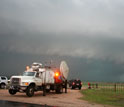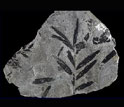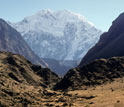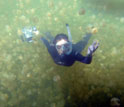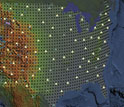News Release 09-196
National Science Foundation Advisory Committee Offers New Vision for the Geosciences
Releases report: "GEO Vision: Unraveling Earth's Complexities through the Geosciences"

NSF's Advisory Committee for Geosciences has released a new report: GEO Vision.
October 15, 2009
This material is available primarily for archival purposes. Telephone numbers or other contact information may be out of date; please see current contact information at media contacts.
Society stands at a crossroads. With growing problems such as resource depletion, energy sustainability, environmental degradation and climate change, can we protect the health of the planet while achieving widespread economic prosperity?
So asks a report released today by the National Science Foundation (NSF)'s Advisory Committee for Geosciences (AC-GEO): GEO Vision: Unraveling Earth's Complexities through the Geosciences.
For most of its history Earth has experienced vast alterations, states the report, in response to natural variations in our planet.
Humans, however, are now emerging as the dominant agent of change.
"It is essential going forward that we have the scientific tools and evidence to understand and anticipate how the Earth will be transformed in the future, and at what rate, in response to these growing pressures," says geoscientist George Davis of the University of Arizona, chair of the AC-GEO.
"To identify these influences and their potential impacts requires an understanding of the Earth, its history, and its systems that's grounded in basic science--a science that probes and ultimately defines the Earth's character."
Such basic research is the domain of the geosciences, which seek to advance a better understanding of Earth and its systems, states the GEO Vision report.
In the United States, NSF is the sole research agency, believes the AC-GEO, with the disciplinary breadth to comprehensively address these diverse challenges.
"It is NSF's geosciences directorate that must engage other NSF directorates and external partners in an ambitious research program that furthers our understanding of Earth, and provides the basis for objective and sound policy formulation and decision-making," says Arden L. Bement, Jr., NSF director.
The challenges ahead for the geosciences, the advisory committee found, are:
- understanding and forecasting the behavior of a complex and evolving Earth system;
- reducing vulnerability and sustaining life; and
- growing the geosciences workforce of the future.
The members of the AC-GEO believe that it's possible to meet these challenges, and to realize a GEO Vision of fostering a sustainable future, through a better understanding of our complex and changing planet.
"Earth is a dynamic marvel of complexity and beauty," says Tim Killeen, NSF assistant director for geosciences. "We as geoscientists must work to meet the challenge of understanding its many facets, and use that knowledge to advance our stewardship of its systems. The AC-GEO's report could not be more timely."
Society as a whole must make wise decisions regarding environmental and resource management, according to GEO Vision, using a grounded and rational set of guidelines.
Scientists and engineers will be called upon in the future to supply the scientific insights and predictive capabilities required to inform key policy decisions, many with long-lasting effects.
"Leading many of those discussions will be geoscientists," states the report, "who will share their understanding of the Earth system with the public and with decision-makers, providing the scientific knowledge that will ultimately guide society as it comes to understand its evolving relationship with the planet."
The AC-GEO's recommendations for NSF's directorate for geosciences, which has three divisions--atmospheric and geospace sciences; earth sciences; and ocean sciences--are to:
- Sustain and nurture fundamental geosciences disciplinary programs;
- Reach out in bold new directions, engaging and incorporating other disciplines;
- Embrace a culture that recognizes that transformational research involves an element of risk;
- Invest wisely and responsibly manage the next generation of tools, technologies, and techniques, including advanced computation to enable cutting-edge research;
- Communicate the critical role the geosciences play in reducing risks from natural hazards;
- Build effective and enduring partnerships within NSF as well as with other federal agencies, the private sector, international organizations, and with other institutions outside U.S. borders;
- Recognize the explicit need for the geosciences to adopt the challenge of increasing the resiliency of natural systems;
- Build bridges between geoscience researchers and the K-12 classroom to promote early childhood and young-adult understanding of geosciences concepts;
- Create a broad and diverse cadre of geosciences researchers who can use creative approaches to geosciences education and literacy at all levels;
- Convey central, and potentially pivotal, geosciences research and findings to policymakers and thought leaders for building a sustainable future.
"We as a society face a daunting task," says Killeen. "Through the help of the AC-GEO, we will make great strides in realizing a new vision for the geosciences--and for the future of our planet."
-NSF-
-
Geoscientists recently mapped Earth's global electrical conductivity in 3-D for the first time.
Credit and Larger Version -
Newly uncovered interactions between the Sun and the Earth affect our climate.
Credit and Larger Version -
Increased desert dust blowing in the wind is altering mountain ecosystems.
Credit and Larger Version -
Geoscientists are using instruments like the Doppler-on-Wheels to study tornado formation.
Credit and Larger Version -
Ancient fossil leaves tell a story of sudden loss of biodiversity that may have current parallels.
Credit and Larger Version -
An aerial view of Long Island shows its low-lying shores, vulnerable to rising sea-levels.
Credit and Larger Version -
The history of glaciers in Peru and around the world is under study by geoscientists.
Credit and Larger Version -
The hybrid remotely operated vehicle Nereus may be tethered or untethered to a mother ship.
Credit and Larger Version -
Jellyfish and other small sea creatures drive large-scale mixing in the oceans.
Credit and Larger Version -
This artist's rendering shows the solar wind as it streaks by Earth.
Credit and Larger Version -
The locations of the new Ocean Observatories Initiative are shown in this graphic.
Credit and Larger Version -
NSF EarthScope scientists have installed seismic stations across the continent.
Credit and Larger Version
Media Contacts
Cheryl Dybas, NSF, (703) 292-7734, email: cdybas@nsf.gov
Related Websites
NSF AC-GEO GEO Vision Report: http://www.nsf.gov/geo/acgeo/geovision/start.jsp
NSF Directorate for Geosciences: http://www.nsf.gov/dir/index.jsp?org=GEO
The U.S. National Science Foundation propels the nation forward by advancing fundamental research in all fields of science and engineering. NSF supports research and people by providing facilities, instruments and funding to support their ingenuity and sustain the U.S. as a global leader in research and innovation. With a fiscal year 2023 budget of $9.5 billion, NSF funds reach all 50 states through grants to nearly 2,000 colleges, universities and institutions. Each year, NSF receives more than 40,000 competitive proposals and makes about 11,000 new awards. Those awards include support for cooperative research with industry, Arctic and Antarctic research and operations, and U.S. participation in international scientific efforts.
Connect with us online
NSF website: nsf.gov
NSF News: nsf.gov/news
For News Media: nsf.gov/news/newsroom
Statistics: nsf.gov/statistics/
Awards database: nsf.gov/awardsearch/
Follow us on social
Twitter: twitter.com/NSF
Facebook: facebook.com/US.NSF
Instagram: instagram.com/nsfgov






